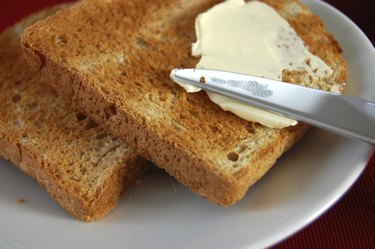
Whether you're looking for a snack or an accompaniment to dinner, eating a slice of bread with a pat of butter on it may be a good choice, depending on your nutritional goals and current health. However, this food combination has quite a bit of sodium and fat. But if you carefully plan your diet so as to keep your intake of unhealthy fats low and healthy grains high, infrequently eating bread with butter should not damage your health.
Calories and Fat
Video of the Day
One slice of whole-grain bread with 1 tbsp. of butter contains 197 calories. If the rest of your meal is highly caloric, eating bread and butter may cause you to overeat on calories. One serving of this food contains 12.8 g of fat, 8 g of which are from bad fat, 0.5 g from trans fat and 7.5 g from saturated fat, primarily from the butter. To decrease the number of calories and amount of fat you consume from this food combo, use thinly-sliced bread, a smaller portion of butter or any number of other condiments.
Video of the Day
Carbohydrates and Fiber
Most of the carbohydrates come from the whole-grain bread. You'll take in 17.4 g of carbs in total - only 0.1 g is from the butter. This food contains 3 g of fiber as well. The carbs in a serving provide energy, while the fiber of the whole-grain bread keeps your bowels healthy. Evidence in the December 2010 edition of the "Nutrition Research" journal indicates that eating a diet high in whole grains and fiber correlates to a lower body weight, so consuming a slice of whole-grain bread with butter may help you maintain a healthy weight.
Protein
Eating a slice of bread with butter provides 4.1 g of protein, or 7.3 to 8.9 percent of the protein you should consume each day. Note that protein content decreases if you choose breads that do not contain whole grains or are not made from whole-grain flour. Protein from this food gives your body the building blocks it needs.
Vitamins and Minerals
One slice of bread with butter provides up 20 percent of the recommended daily intake of vitamin D, and it also serves as a good source of calcium, vitamin B-6, magnesium, iron, vitamin B-12, niacin and zinc, with 10 percent of the amount of these nutrients you need in a day. You'll take in smaller amounts of riboflavin, folate and iodine.
Health Considerations
Including a slice of bread spread with butter in your diet adds 234.7 mg of sodium to your meal plan totals. This may not seem like a significant amount when you consider your suggested daily limit ranges from 1,500 mg to 2,300 mg per day, but many foods contain high levels of sodium and hidden sodium, all of which add up quickly.
- Fitbit: 100% Whole Grain Bread
- Fitbit: Butter
- MayoClinic.com; Dietary Fiber: Essential For a Healthy Diet; November 2009
- "Nutrition Research"; Whole Grain and Fiber Consumption Are Associated With...; C.E. O'Neil, et al.; December 2010
- U.S. Centers for Disease Control and Prevention; Americans Consume Too Much Sodium; February 2011